401021 - Being a Professional Nurse or Midwife: New Graduate Essay
VerifiedAdded on 2023/06/04
|7
|1749
|100
Essay
AI Summary
This essay critically analyzes the transition of new graduate nurses and midwives into professional practice. It explores the challenges faced, emphasizing the importance of both clinical and non-clinical skills such as communication, problem-solving, and decision-making. The essay discusses the roles and responsibilities of nurses and midwives, highlighting the stages of professional development according to Benner's model. It also reflects on strategies for personal and professional growth, including teamwork, research, and ethical conduct. The conclusion reinforces the significance of continuous learning and skill development for a successful nursing or midwifery career, emphasizing the need to overcome barriers and achieve professional goals. The essay references multiple sources to support its arguments and provides a comprehensive overview of the topic.
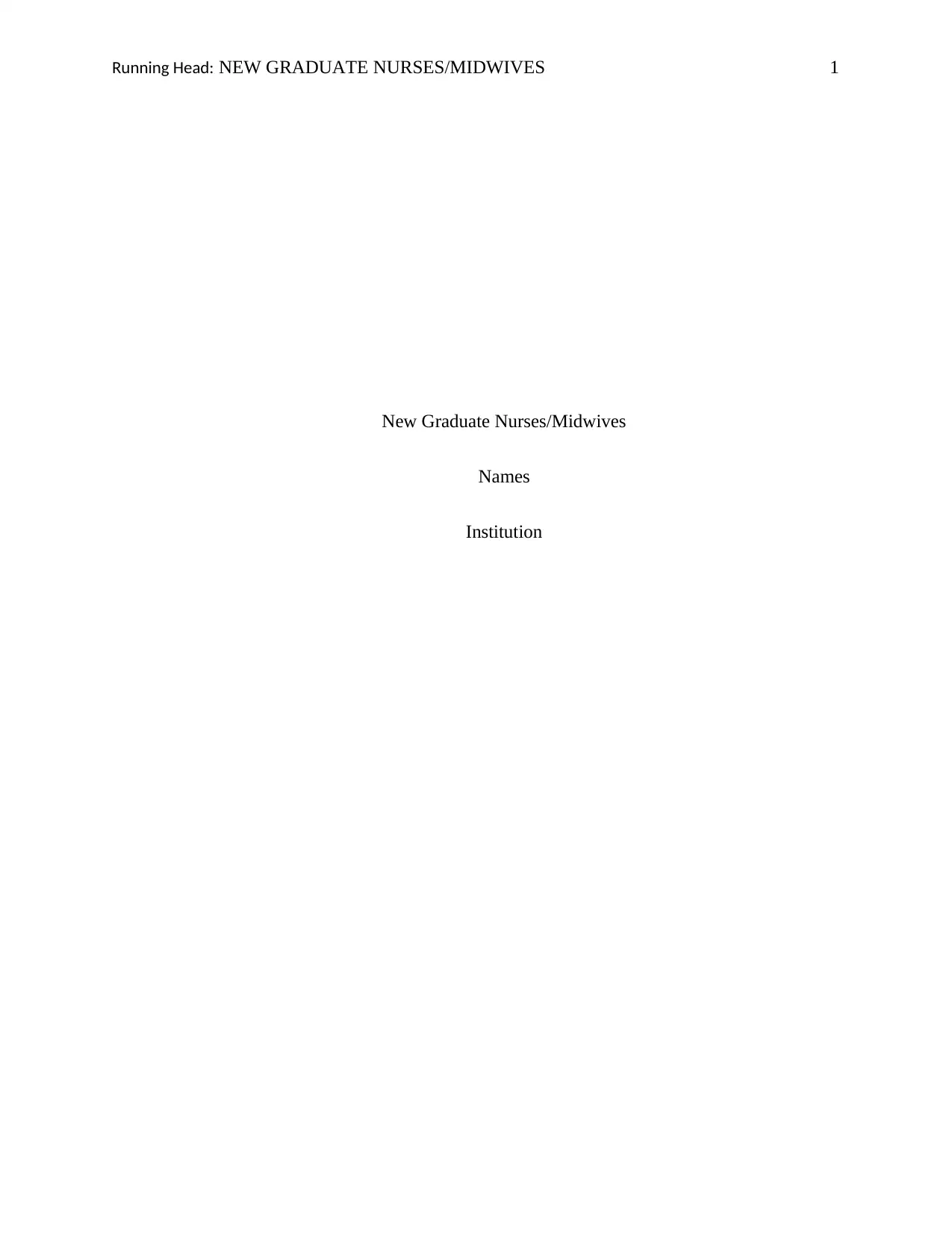
Running Head: NEW GRADUATE NURSES/MIDWIVES 1
New Graduate Nurses/Midwives
Names
Institution
New Graduate Nurses/Midwives
Names
Institution
Paraphrase This Document
Need a fresh take? Get an instant paraphrase of this document with our AI Paraphraser
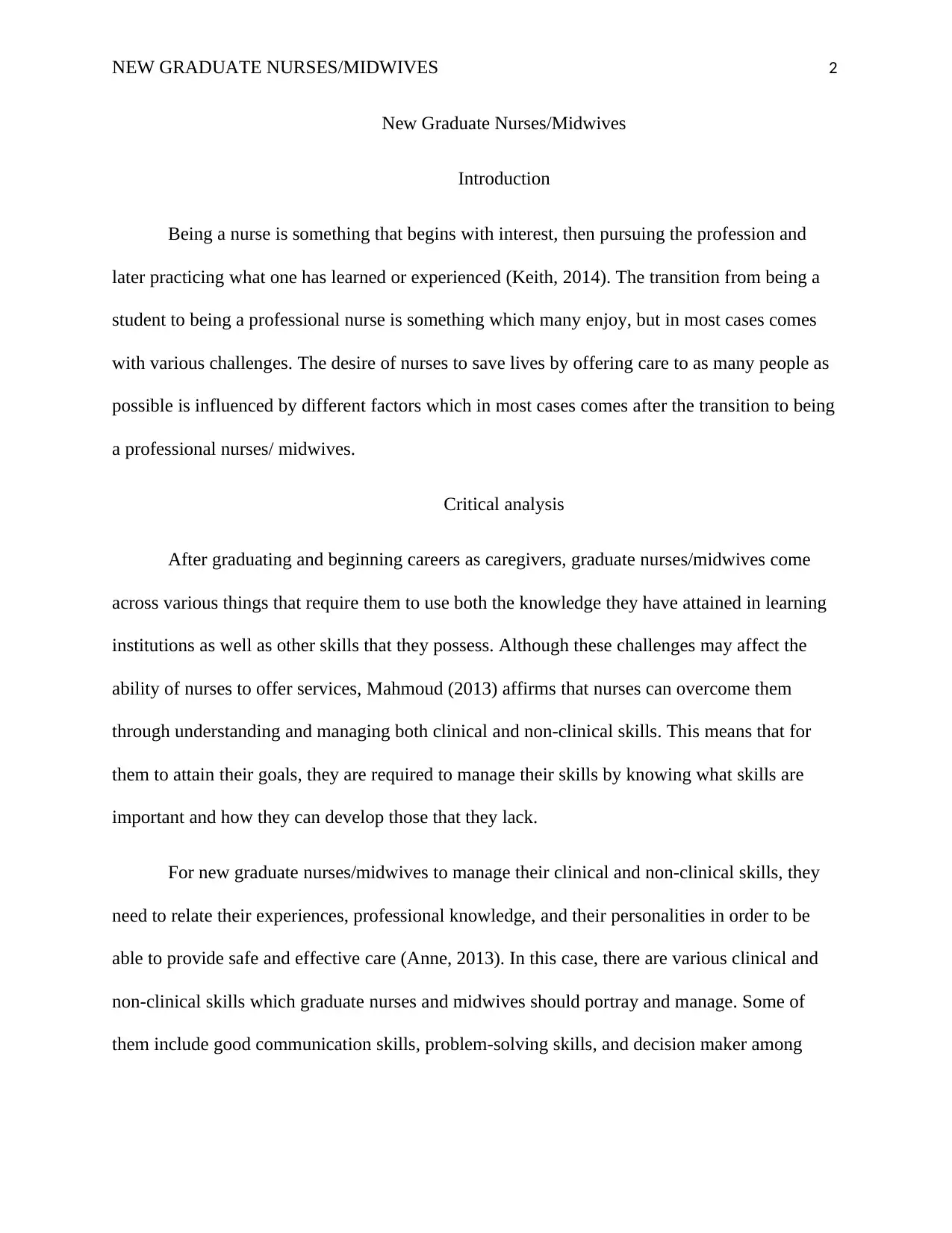
NEW GRADUATE NURSES/MIDWIVES 2
New Graduate Nurses/Midwives
Introduction
Being a nurse is something that begins with interest, then pursuing the profession and
later practicing what one has learned or experienced (Keith, 2014). The transition from being a
student to being a professional nurse is something which many enjoy, but in most cases comes
with various challenges. The desire of nurses to save lives by offering care to as many people as
possible is influenced by different factors which in most cases comes after the transition to being
a professional nurses/ midwives.
Critical analysis
After graduating and beginning careers as caregivers, graduate nurses/midwives come
across various things that require them to use both the knowledge they have attained in learning
institutions as well as other skills that they possess. Although these challenges may affect the
ability of nurses to offer services, Mahmoud (2013) affirms that nurses can overcome them
through understanding and managing both clinical and non-clinical skills. This means that for
them to attain their goals, they are required to manage their skills by knowing what skills are
important and how they can develop those that they lack.
For new graduate nurses/midwives to manage their clinical and non-clinical skills, they
need to relate their experiences, professional knowledge, and their personalities in order to be
able to provide safe and effective care (Anne, 2013). In this case, there are various clinical and
non-clinical skills which graduate nurses and midwives should portray and manage. Some of
them include good communication skills, problem-solving skills, and decision maker among
New Graduate Nurses/Midwives
Introduction
Being a nurse is something that begins with interest, then pursuing the profession and
later practicing what one has learned or experienced (Keith, 2014). The transition from being a
student to being a professional nurse is something which many enjoy, but in most cases comes
with various challenges. The desire of nurses to save lives by offering care to as many people as
possible is influenced by different factors which in most cases comes after the transition to being
a professional nurses/ midwives.
Critical analysis
After graduating and beginning careers as caregivers, graduate nurses/midwives come
across various things that require them to use both the knowledge they have attained in learning
institutions as well as other skills that they possess. Although these challenges may affect the
ability of nurses to offer services, Mahmoud (2013) affirms that nurses can overcome them
through understanding and managing both clinical and non-clinical skills. This means that for
them to attain their goals, they are required to manage their skills by knowing what skills are
important and how they can develop those that they lack.
For new graduate nurses/midwives to manage their clinical and non-clinical skills, they
need to relate their experiences, professional knowledge, and their personalities in order to be
able to provide safe and effective care (Anne, 2013). In this case, there are various clinical and
non-clinical skills which graduate nurses and midwives should portray and manage. Some of
them include good communication skills, problem-solving skills, and decision maker among
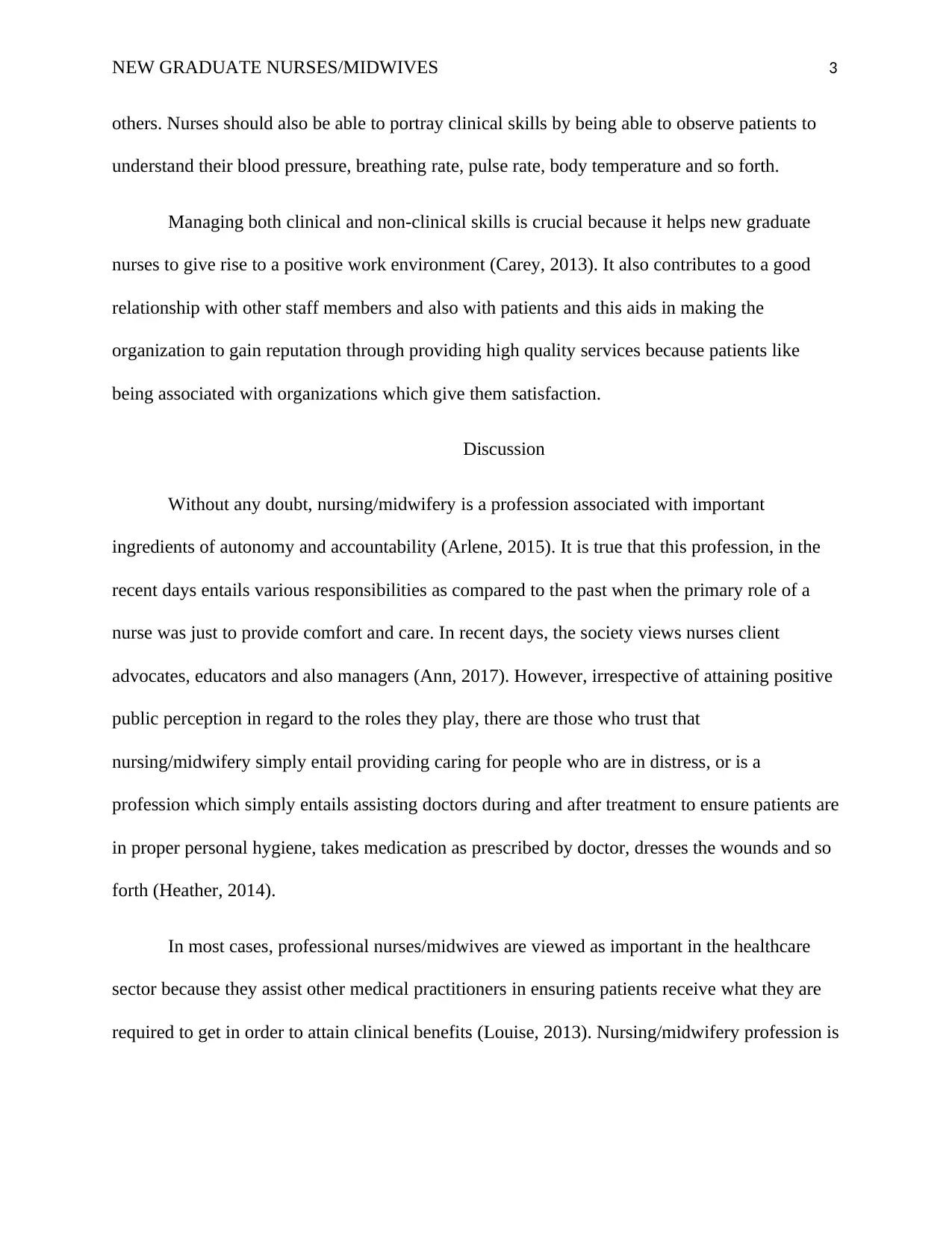
NEW GRADUATE NURSES/MIDWIVES 3
others. Nurses should also be able to portray clinical skills by being able to observe patients to
understand their blood pressure, breathing rate, pulse rate, body temperature and so forth.
Managing both clinical and non-clinical skills is crucial because it helps new graduate
nurses to give rise to a positive work environment (Carey, 2013). It also contributes to a good
relationship with other staff members and also with patients and this aids in making the
organization to gain reputation through providing high quality services because patients like
being associated with organizations which give them satisfaction.
Discussion
Without any doubt, nursing/midwifery is a profession associated with important
ingredients of autonomy and accountability (Arlene, 2015). It is true that this profession, in the
recent days entails various responsibilities as compared to the past when the primary role of a
nurse was just to provide comfort and care. In recent days, the society views nurses client
advocates, educators and also managers (Ann, 2017). However, irrespective of attaining positive
public perception in regard to the roles they play, there are those who trust that
nursing/midwifery simply entail providing caring for people who are in distress, or is a
profession which simply entails assisting doctors during and after treatment to ensure patients are
in proper personal hygiene, takes medication as prescribed by doctor, dresses the wounds and so
forth (Heather, 2014).
In most cases, professional nurses/midwives are viewed as important in the healthcare
sector because they assist other medical practitioners in ensuring patients receive what they are
required to get in order to attain clinical benefits (Louise, 2013). Nursing/midwifery profession is
others. Nurses should also be able to portray clinical skills by being able to observe patients to
understand their blood pressure, breathing rate, pulse rate, body temperature and so forth.
Managing both clinical and non-clinical skills is crucial because it helps new graduate
nurses to give rise to a positive work environment (Carey, 2013). It also contributes to a good
relationship with other staff members and also with patients and this aids in making the
organization to gain reputation through providing high quality services because patients like
being associated with organizations which give them satisfaction.
Discussion
Without any doubt, nursing/midwifery is a profession associated with important
ingredients of autonomy and accountability (Arlene, 2015). It is true that this profession, in the
recent days entails various responsibilities as compared to the past when the primary role of a
nurse was just to provide comfort and care. In recent days, the society views nurses client
advocates, educators and also managers (Ann, 2017). However, irrespective of attaining positive
public perception in regard to the roles they play, there are those who trust that
nursing/midwifery simply entail providing caring for people who are in distress, or is a
profession which simply entails assisting doctors during and after treatment to ensure patients are
in proper personal hygiene, takes medication as prescribed by doctor, dresses the wounds and so
forth (Heather, 2014).
In most cases, professional nurses/midwives are viewed as important in the healthcare
sector because they assist other medical practitioners in ensuring patients receive what they are
required to get in order to attain clinical benefits (Louise, 2013). Nursing/midwifery profession is
⊘ This is a preview!⊘
Do you want full access?
Subscribe today to unlock all pages.

Trusted by 1+ million students worldwide
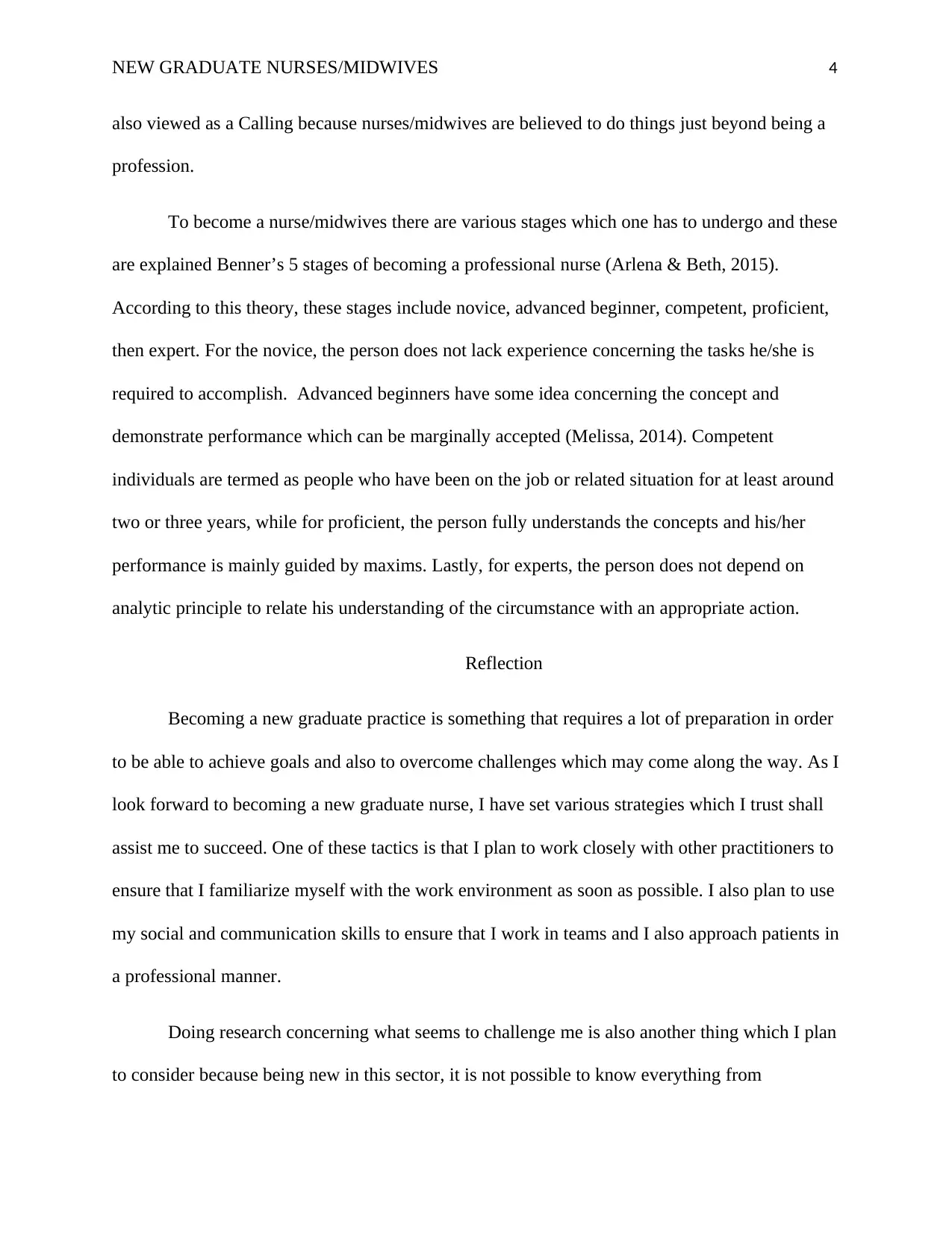
NEW GRADUATE NURSES/MIDWIVES 4
also viewed as a Calling because nurses/midwives are believed to do things just beyond being a
profession.
To become a nurse/midwives there are various stages which one has to undergo and these
are explained Benner’s 5 stages of becoming a professional nurse (Arlena & Beth, 2015).
According to this theory, these stages include novice, advanced beginner, competent, proficient,
then expert. For the novice, the person does not lack experience concerning the tasks he/she is
required to accomplish. Advanced beginners have some idea concerning the concept and
demonstrate performance which can be marginally accepted (Melissa, 2014). Competent
individuals are termed as people who have been on the job or related situation for at least around
two or three years, while for proficient, the person fully understands the concepts and his/her
performance is mainly guided by maxims. Lastly, for experts, the person does not depend on
analytic principle to relate his understanding of the circumstance with an appropriate action.
Reflection
Becoming a new graduate practice is something that requires a lot of preparation in order
to be able to achieve goals and also to overcome challenges which may come along the way. As I
look forward to becoming a new graduate nurse, I have set various strategies which I trust shall
assist me to succeed. One of these tactics is that I plan to work closely with other practitioners to
ensure that I familiarize myself with the work environment as soon as possible. I also plan to use
my social and communication skills to ensure that I work in teams and I also approach patients in
a professional manner.
Doing research concerning what seems to challenge me is also another thing which I plan
to consider because being new in this sector, it is not possible to know everything from
also viewed as a Calling because nurses/midwives are believed to do things just beyond being a
profession.
To become a nurse/midwives there are various stages which one has to undergo and these
are explained Benner’s 5 stages of becoming a professional nurse (Arlena & Beth, 2015).
According to this theory, these stages include novice, advanced beginner, competent, proficient,
then expert. For the novice, the person does not lack experience concerning the tasks he/she is
required to accomplish. Advanced beginners have some idea concerning the concept and
demonstrate performance which can be marginally accepted (Melissa, 2014). Competent
individuals are termed as people who have been on the job or related situation for at least around
two or three years, while for proficient, the person fully understands the concepts and his/her
performance is mainly guided by maxims. Lastly, for experts, the person does not depend on
analytic principle to relate his understanding of the circumstance with an appropriate action.
Reflection
Becoming a new graduate practice is something that requires a lot of preparation in order
to be able to achieve goals and also to overcome challenges which may come along the way. As I
look forward to becoming a new graduate nurse, I have set various strategies which I trust shall
assist me to succeed. One of these tactics is that I plan to work closely with other practitioners to
ensure that I familiarize myself with the work environment as soon as possible. I also plan to use
my social and communication skills to ensure that I work in teams and I also approach patients in
a professional manner.
Doing research concerning what seems to challenge me is also another thing which I plan
to consider because being new in this sector, it is not possible to know everything from
Paraphrase This Document
Need a fresh take? Get an instant paraphrase of this document with our AI Paraphraser
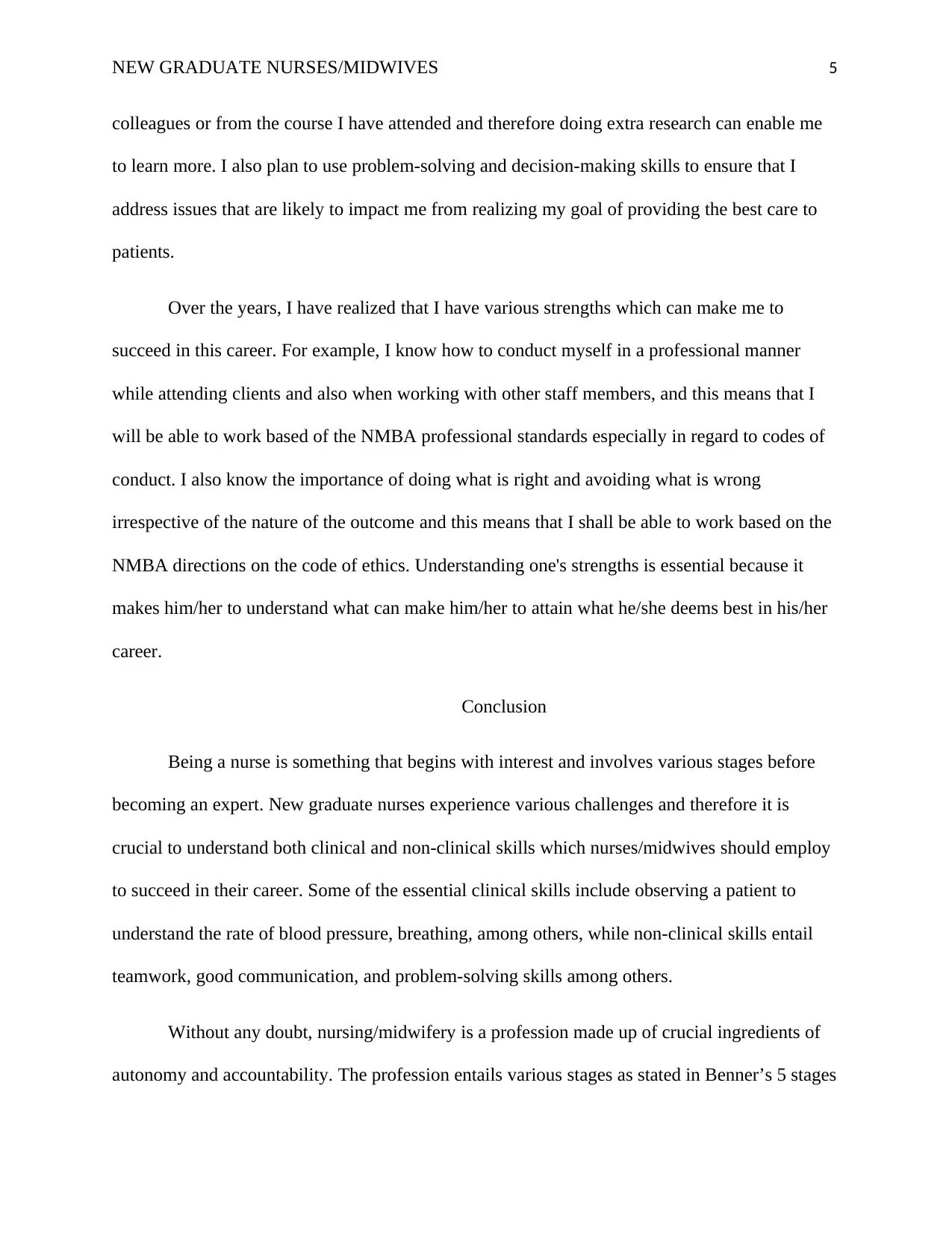
NEW GRADUATE NURSES/MIDWIVES 5
colleagues or from the course I have attended and therefore doing extra research can enable me
to learn more. I also plan to use problem-solving and decision-making skills to ensure that I
address issues that are likely to impact me from realizing my goal of providing the best care to
patients.
Over the years, I have realized that I have various strengths which can make me to
succeed in this career. For example, I know how to conduct myself in a professional manner
while attending clients and also when working with other staff members, and this means that I
will be able to work based of the NMBA professional standards especially in regard to codes of
conduct. I also know the importance of doing what is right and avoiding what is wrong
irrespective of the nature of the outcome and this means that I shall be able to work based on the
NMBA directions on the code of ethics. Understanding one's strengths is essential because it
makes him/her to understand what can make him/her to attain what he/she deems best in his/her
career.
Conclusion
Being a nurse is something that begins with interest and involves various stages before
becoming an expert. New graduate nurses experience various challenges and therefore it is
crucial to understand both clinical and non-clinical skills which nurses/midwives should employ
to succeed in their career. Some of the essential clinical skills include observing a patient to
understand the rate of blood pressure, breathing, among others, while non-clinical skills entail
teamwork, good communication, and problem-solving skills among others.
Without any doubt, nursing/midwifery is a profession made up of crucial ingredients of
autonomy and accountability. The profession entails various stages as stated in Benner’s 5 stages
colleagues or from the course I have attended and therefore doing extra research can enable me
to learn more. I also plan to use problem-solving and decision-making skills to ensure that I
address issues that are likely to impact me from realizing my goal of providing the best care to
patients.
Over the years, I have realized that I have various strengths which can make me to
succeed in this career. For example, I know how to conduct myself in a professional manner
while attending clients and also when working with other staff members, and this means that I
will be able to work based of the NMBA professional standards especially in regard to codes of
conduct. I also know the importance of doing what is right and avoiding what is wrong
irrespective of the nature of the outcome and this means that I shall be able to work based on the
NMBA directions on the code of ethics. Understanding one's strengths is essential because it
makes him/her to understand what can make him/her to attain what he/she deems best in his/her
career.
Conclusion
Being a nurse is something that begins with interest and involves various stages before
becoming an expert. New graduate nurses experience various challenges and therefore it is
crucial to understand both clinical and non-clinical skills which nurses/midwives should employ
to succeed in their career. Some of the essential clinical skills include observing a patient to
understand the rate of blood pressure, breathing, among others, while non-clinical skills entail
teamwork, good communication, and problem-solving skills among others.
Without any doubt, nursing/midwifery is a profession made up of crucial ingredients of
autonomy and accountability. The profession entails various stages as stated in Benner’s 5 stages
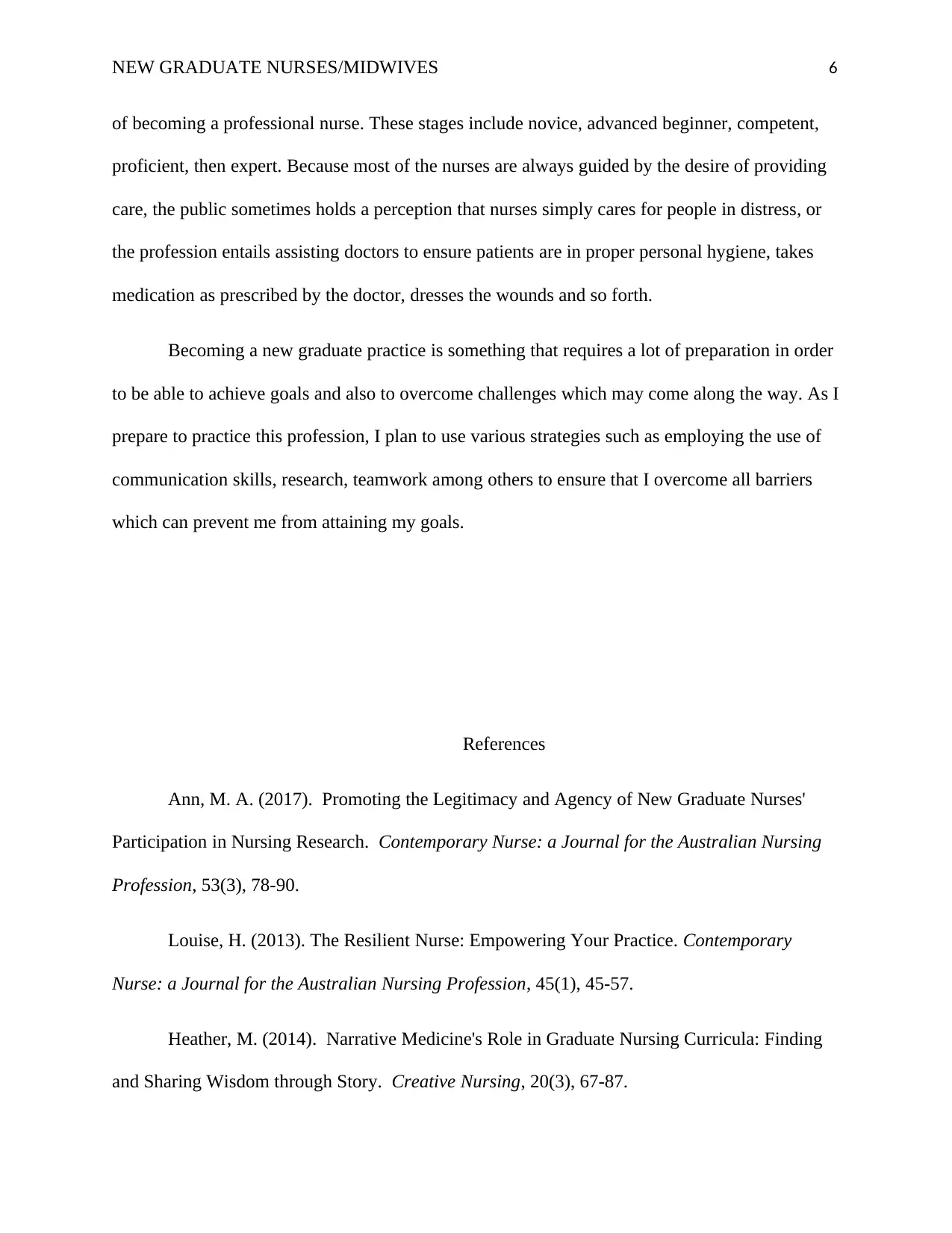
NEW GRADUATE NURSES/MIDWIVES 6
of becoming a professional nurse. These stages include novice, advanced beginner, competent,
proficient, then expert. Because most of the nurses are always guided by the desire of providing
care, the public sometimes holds a perception that nurses simply cares for people in distress, or
the profession entails assisting doctors to ensure patients are in proper personal hygiene, takes
medication as prescribed by the doctor, dresses the wounds and so forth.
Becoming a new graduate practice is something that requires a lot of preparation in order
to be able to achieve goals and also to overcome challenges which may come along the way. As I
prepare to practice this profession, I plan to use various strategies such as employing the use of
communication skills, research, teamwork among others to ensure that I overcome all barriers
which can prevent me from attaining my goals.
References
Ann, M. A. (2017). Promoting the Legitimacy and Agency of New Graduate Nurses'
Participation in Nursing Research. Contemporary Nurse: a Journal for the Australian Nursing
Profession, 53(3), 78-90.
Louise, H. (2013). The Resilient Nurse: Empowering Your Practice. Contemporary
Nurse: a Journal for the Australian Nursing Profession, 45(1), 45-57.
Heather, M. (2014). Narrative Medicine's Role in Graduate Nursing Curricula: Finding
and Sharing Wisdom through Story. Creative Nursing, 20(3), 67-87.
of becoming a professional nurse. These stages include novice, advanced beginner, competent,
proficient, then expert. Because most of the nurses are always guided by the desire of providing
care, the public sometimes holds a perception that nurses simply cares for people in distress, or
the profession entails assisting doctors to ensure patients are in proper personal hygiene, takes
medication as prescribed by the doctor, dresses the wounds and so forth.
Becoming a new graduate practice is something that requires a lot of preparation in order
to be able to achieve goals and also to overcome challenges which may come along the way. As I
prepare to practice this profession, I plan to use various strategies such as employing the use of
communication skills, research, teamwork among others to ensure that I overcome all barriers
which can prevent me from attaining my goals.
References
Ann, M. A. (2017). Promoting the Legitimacy and Agency of New Graduate Nurses'
Participation in Nursing Research. Contemporary Nurse: a Journal for the Australian Nursing
Profession, 53(3), 78-90.
Louise, H. (2013). The Resilient Nurse: Empowering Your Practice. Contemporary
Nurse: a Journal for the Australian Nursing Profession, 45(1), 45-57.
Heather, M. (2014). Narrative Medicine's Role in Graduate Nursing Curricula: Finding
and Sharing Wisdom through Story. Creative Nursing, 20(3), 67-87.
⊘ This is a preview!⊘
Do you want full access?
Subscribe today to unlock all pages.

Trusted by 1+ million students worldwide
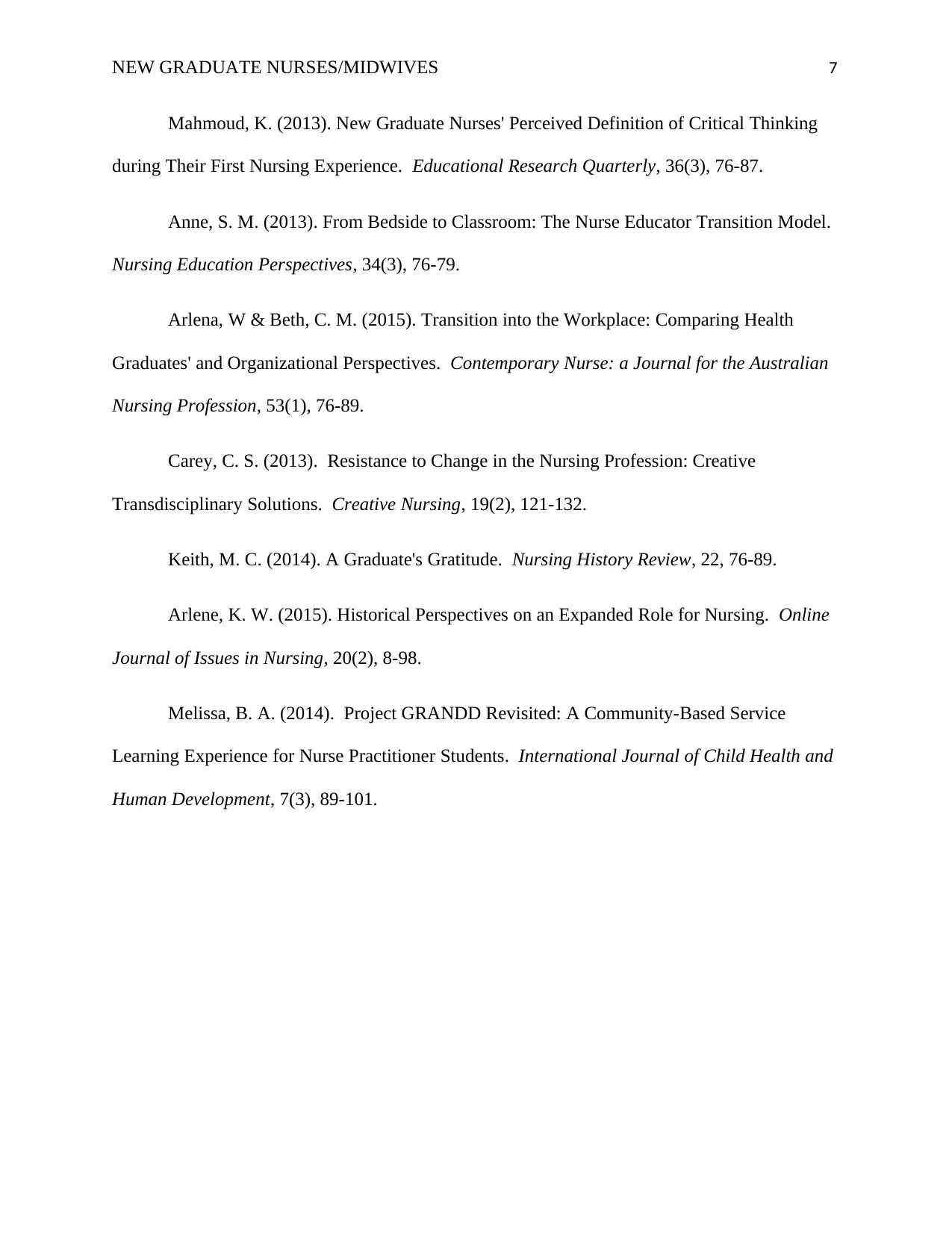
NEW GRADUATE NURSES/MIDWIVES 7
Mahmoud, K. (2013). New Graduate Nurses' Perceived Definition of Critical Thinking
during Their First Nursing Experience. Educational Research Quarterly, 36(3), 76-87.
Anne, S. M. (2013). From Bedside to Classroom: The Nurse Educator Transition Model.
Nursing Education Perspectives, 34(3), 76-79.
Arlena, W & Beth, C. M. (2015). Transition into the Workplace: Comparing Health
Graduates' and Organizational Perspectives. Contemporary Nurse: a Journal for the Australian
Nursing Profession, 53(1), 76-89.
Carey, C. S. (2013). Resistance to Change in the Nursing Profession: Creative
Transdisciplinary Solutions. Creative Nursing, 19(2), 121-132.
Keith, M. C. (2014). A Graduate's Gratitude. Nursing History Review, 22, 76-89.
Arlene, K. W. (2015). Historical Perspectives on an Expanded Role for Nursing. Online
Journal of Issues in Nursing, 20(2), 8-98.
Melissa, B. A. (2014). Project GRANDD Revisited: A Community-Based Service
Learning Experience for Nurse Practitioner Students. International Journal of Child Health and
Human Development, 7(3), 89-101.
Mahmoud, K. (2013). New Graduate Nurses' Perceived Definition of Critical Thinking
during Their First Nursing Experience. Educational Research Quarterly, 36(3), 76-87.
Anne, S. M. (2013). From Bedside to Classroom: The Nurse Educator Transition Model.
Nursing Education Perspectives, 34(3), 76-79.
Arlena, W & Beth, C. M. (2015). Transition into the Workplace: Comparing Health
Graduates' and Organizational Perspectives. Contemporary Nurse: a Journal for the Australian
Nursing Profession, 53(1), 76-89.
Carey, C. S. (2013). Resistance to Change in the Nursing Profession: Creative
Transdisciplinary Solutions. Creative Nursing, 19(2), 121-132.
Keith, M. C. (2014). A Graduate's Gratitude. Nursing History Review, 22, 76-89.
Arlene, K. W. (2015). Historical Perspectives on an Expanded Role for Nursing. Online
Journal of Issues in Nursing, 20(2), 8-98.
Melissa, B. A. (2014). Project GRANDD Revisited: A Community-Based Service
Learning Experience for Nurse Practitioner Students. International Journal of Child Health and
Human Development, 7(3), 89-101.
1 out of 7
Related Documents
Your All-in-One AI-Powered Toolkit for Academic Success.
+13062052269
info@desklib.com
Available 24*7 on WhatsApp / Email
![[object Object]](/_next/static/media/star-bottom.7253800d.svg)
Unlock your academic potential
Copyright © 2020–2026 A2Z Services. All Rights Reserved. Developed and managed by ZUCOL.




